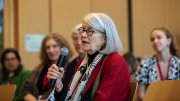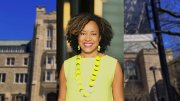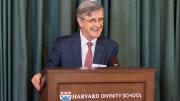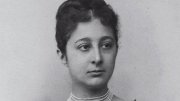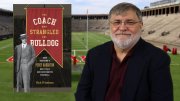“I think we are facing an existential crisis as a University,” said Ali Asani during a panel discussion on religious pluralism last Friday afternoon at the Harvard Divinity School, during which the campus divides over Israel-Palestine were at times front and center. Part of a daylong event commemorating the fiftieth anniversary of College’s undergraduate program in comparative religion, the discussion was in part a celebration of the University’s Pluralism Project, which studies religious diversity and interfaith relations in the United States; and of its founder, Diana Eck, who is retiring this year as professor of comparative religion and Indian studies and Wertham professor of law and psychiatry in society.
The inescapable backdrop for the conversation, though, was the months-long unrest at Harvard and other campuses over the Israeli war in Gaza, and the religious and political tensions the conflict has inflamed across the country. More than one panelist argued that those problems make the Pluralism Project’s work more essential than ever. Eck, a scholar of Hinduism, opened the discussion with a recollection of the organization’s founding in 1991. She noted the racial and religious antipathies that have persisted even as the United States has become a more multi-religious and multicultural society. At the Pluralism Project, she said, “Our work is really about identifying that there are conflicts, of course, but then to study them and ask, ‘How are people coming together?’ Not so much, ‘How are they digging themselves in deeper on their own side of the tide?’”
Eck and Asani, the Albertson professor of Middle Eastern studies and professor of Indo-Muslim and Islamic religion and culture, reiterated some of the points they’d made earlier in the week at a Faculty of Arts and Sciences meeting. Both serve on Harvard’s task force on combating anti-Muslim and anti-Arab bias (Asani is its co-chair), and they advocated expanding case-method instruction at the University as a way to help resolve the kinds of painful and difficult disputes that have arisen on campus during this past school year. The case method is historically associated with law and business school pedagogy, but the Pluralism Project began experimenting with it in 2005, incorporating it into Eck’s course, “Religion in Multicultural America: Case Studies in Religious Pluralism.” In 2023, a compilation volume was published, Pluralism in Practice: Case Studies of Leadership in a Religiously Diverse America (written by Elinor J. Pierce, the Pluralism Project’s research director, with an afterword by Eck).
“The dream,” Asani said, “is to introduce a course, required of all Harvard students, regardless of the faculty, using the pluralism case method.” He said he envisions class sections that would mix together students from different parts of the University in the same classrooms. The course, he said, would give students “the tools and frameworks to engage with and understand difference. That should be one of the attributes of any graduate of Harvard.” When he said this, listeners in the room applauded.
This is a pitch he has made before. Asani recalled being in Pakistan on October 7, when Hamas attacked Israelis, setting off the current war. He was there that day to make a presentation to the Karachi-based Aga Khan University (an institution with roots at Harvard), promoting the idea of a required case-method course on pluralism. He returned to Cambridge afterward to find “everything here was a mess,” and in need of the same kind of pluralism instruction he’d been advocating abroad. “At this moment,” he said, “everyone’s seeing the world through binaries, and we know how dangerous binaries are.” He paraphrased Amartya Sen, Lamont University Professor and professor of economics and philosophy, who wrote that the impulse to categorize human beings into single categories leads to a “haziness of vision,” Asani said, which “the champions of violence will exploit.…That is exactly what’s happening here.” The question now, Asani continued, is “How to move from this binary world that we have been forced into, and go into a pluralist mode? How do we change the narrative? This is something that we have to struggle with.” The struggle, he argued, is not only urgent, but existential. “In Pakistan you quote the Koran, but here we have ‘E pluribus unum.’ What happened to that?”
Later, in response to an audience questioner who expressed surprise that the two University task forces, on antisemitism and on anti-Muslim and anti-Arab bias, were established as separate groups, Asani explained that the current divisions on campus necessitated it: “If we just had a combined listening session, there were students who wouldn’t show up.” But a goal, he said, is for the two groups to begin to come together wherever possible, to “[build] community and pluralism.” He also noted that he was a member of the Harvard presidential committee that in 2018 released an updated statement of University values, which included “respect for the rights, differences, and dignity of others” and “responsibility for the bonds and bridges that enable all to grow with and learn from each other.” Looking back at the statement now, he said, “We’ve obviously veered off those values. Why and how did we do that? And how do we get back to those? …So, we’re using that [statement] as an anchor to work with both task forces, and I think that will bring us together.”
The other panelists, too, offered comments that gestured toward current tensions. Whittney Barth, M.Div. ’11, executive director of the Center for the Study of Law and Religion at Emory University, who was among the early students in Eck’s case-method course, spoke of the importance in the classroom not only of “deep listening and understanding” and the search for common ground, but also the need “to sit with those differences. Sometimes they can’t be reconciled. And so what do you do with that?”
Anant Rambachan, religion professor emeritus at Saint Olaf College in Minnesota, called pluralism a necessity “for building campus community and for overcoming ignorance and fear, which are the conditions for violence.” But he also spoke of it as a more celebratory necessity: “What is the religious value of having a world in which there are Muslims, there are Buddhists, Jews, Sikhs, Jains? …Do we have a religious need for each other?”
Susan Shumaker, M.T.S. ’91, a story producer for Florentine Films (Ken Burns’s documentary production company), talked about her most recent project, The American Buffalo, released last year. She described the near-extinction of the buffalo as a story of “religious difference,” between Native Americans’ and European settlers’ approaches to nature. “I often think that our films are sort of a morality tale,” she said, “a case study for how bad things can get if the Pluralism Project doesn’t work.”
Eck closed the discussion with a bit of inter-religious hopefulness: “In the Hindu calendar, this is the third day of the brightening fortnight of the month Vaisakha,” she said. “It is a day called Akshaya Tritiya, which is the one day in the year when anything you do becomes immortal. Thank you for all your words today.”
